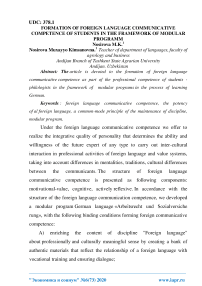Formation of foreign language communicative competence of students in the framework of modular program
Автор: Nosirova M.K.
Журнал: Экономика и социум @ekonomika-socium
Рубрика: Основной раздел
Статья в выпуске: 6-1 (73), 2020 года.
Бесплатный доступ
The article is devoted to the formation of foreign language communicative competence as part of the professional competence of students - philologists in the framework of modular programs in the process of learning German.
Foreign language communicative competence, the potency of al foreign language, a common-mode principle of the maintenance of discipline, modular program
Короткий адрес: https://sciup.org/140252400
IDR: 140252400 | УДК: 378.1
Текст научной статьи Formation of foreign language communicative competence of students in the framework of modular program
Under the foreign language communicative competence we offer to realize the integrative quality of personality that determines the ability and willingness of the future expert of any type to carry out inter-cultural interaction in professional activities of foreign language and value systems, taking into account differences in mentalities, traditions, cultural differences between the communicants. The structure of foreign language communicative competence is presented as following components: motivational-value, cognitive, actively reflexive. In accordance with the structure of the foreign language communication competence, we developed a modular program German language «Arbeitsrecht und Sozialversiche rung», with the following binding conditions forming foreign communicative competence:
-
A) enriching the content of discipline "Foreign language" about professionally and culturally meaningful sense by creating a bank of authentic materials that reflect the relationship of a foreign language with vocational training and ensuring dialogue;
-
B) the use of communication technologies in teaching foreign language of the country as a leading, allowing to realize and adequate feedback, implies Institute Intellectual and activity reflection.
It is necessary to emphasize the role of the in-phase with the formation of the future specialist of the principle of alignment of content integrated into a single block of training modules in a foreign language, great labor Wu, social security law in motivating how to master the profession and language learning, and to further intercultural dialogue in Nome professional field. A foreign language is open for use by content from various fields of knowledge. Integrating allows one student to transfer knowledge from profiling skills boiling subjects in a foreign language and vice versa, in the future to use a foreign language in professional activity to acquire knowledge. Potential foreign language as well as educational discipline is of value and meaning making communication with the communication to the foreign language culture and identification of the native culture, while gaining student communication skills and experience of intersubjective and professional communication.
Actions of students in the educational, professional and professional situations enrich the experience, becoming the basis for a more efficient formation of foreign language communicative competence of students. Thus, knowledge is not digestible for the sake of assimilation, passing examinations, and are quite certain semantic feature, which is linked to the complex cognitive and professional motives and interests of students. In the context of the transition training curriculum for professional work provided by the gradual transformation of her motifs from training to professional.
The new trend of language education needs to take into account temperature specifics of professional communication experts of their country and the country of studied language.
Formation of a foreign language communicative competence of the future specialist it is advisable to carry out through the dialogue of cultures that Island children to an understanding of foreign language in professional activity at the expense of understanding and awareness of the similarities and differences in mentality, social norms and occupation of other peoples. Most often, the dialogue of cultures is understood as a communion of students to the cultural values of the people studied hoped-language. But the mere introduction to the world culture and the values of the people of the studied language does not turn the learning process into a dialogue of cultures, since students have no idea about the values of their native culture. So about once a dialogue of cultures - a comparative foreign language and foreign language culture, combined with in-depth study of the native language and culture, as professionally and culturally significant features of the language are revealed when comparing the native and foreign culture.
Thus, the orientation of the subject learning plan foreign Nome language, its form and content in the future student culturally appropriate representatives studied the hoped-language designed to provide motivational basis of the educational process.
"Экономика и социум" №6(73) 2020
Список литературы Formation of foreign language communicative competence of students in the framework of modular program
- 1. Mushinskaya, A.S. (formerly Epifantseva A.S.) Foreign-language communicative competence as part of the professional competence of a student of a medical college / A.C. Mu Shinskiy // Education, society, teacher: cooperation and responsibility: collec tive monograph: in 2m / comp. and scientific. ed. prof. V.G. Ryndak; Ministry of Education and Science Federation, OGPU. - Orenburg: OGPU Publishing House, 2010 - S. 232-242.
- 2. Sandra Jotzo Schritte plus im Beruf. - Hueber Verlag, 2009.


